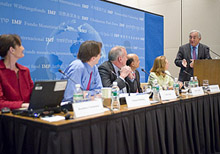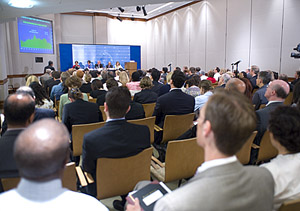The IMF and Civil Society

Some countries really are at a tipping point," said IMF Managing Director Dominique Strauss-Kahn at the release of the study based on information and analysis by IMF economists working on 162 countries.
The Impact of the Food and Fuel Crisis
July 1, 2008
Surging oil and food prices are being felt globally, but the impact is most severe for import-dependent poor and middle-income countries that are confronting balance of payments problems and higher inflation. The poor in those countries face the most acute difficulties. Those are the findings of IMF studies of the implications of the recent sharp rise in food and fuel prices.
More than 100 representatives from the media, civil society organizations, and academics attended a July 1 seminar at IMF headquarters to discuss two papers on the emerging crisis: "Food and Fuel Prices-Recent Developments, Macroeconomic Impact, and Policy Response" and "The Balance of Payments Impact of the Food and Fuel Price Shocks on Low-Income African Countries: A Country-by-Country Assessment."
In opening remarks at the seminar, IMF Managing Director Dominique Strauss-Kahn said that higher oil and food prices were reducing living standards everywhere, making it more difficult for governments to support growth and contain inflation at the same time. The stakes were much higher for middle- and low-income countries than for advanced economies, he said: "For the very poor, high food prices can mean deep poverty, hunger and malnutrition."
Strauss-Kahn called for a "broad cooperative approach" to help tackle higher oil and food prices. "We need to recognize the severity of the challenge now facing so many countries and help them implement relief measures that do not jeopardize economic stability. Their challenge is ours," he said. His main message to the leaders of the Group of Eight at their meeting this week in Japan was that inflation should be the top concern of policymakers. "When you worry about high oil and food prices, you should be concerned about growth, but even more concerned about inflation," Strauss-Kahn said.
Key Findings of the New Study
In their presentations, Patricia Alonso-Gamo and Mark Plant of the IMF Policy Development and Review Department (PDR), Benedicte Christensen of the African Department (AFR), Sanjeev Gupta of the Fiscal Affairs Department (FAD), and Thomas Helbling of the Research Department (RES), discussed the factors driving high food and fuel prices and what the future might hold. They outlined the budgetary implications of the measures taken by countries to mitigate the impact of the price shock, and the impact on the balance of payments and inflation. They also talked about the impact of the shock on African countries.
Questions from the audience
Following the presentations, the panel took questions from the audience. Elizabeth Stuart from Oxfam International asked whether financing under the Poverty Reduction and Growth Facility (PRGF) would add to countries' debt burdens. Christensen explained that lending terms under the PRGF are concessional, and that the Fund analyzes the impact of a new loan or loan augmentation on a country's debt load before committing more resources.

The IMF panel presented its findings on the impact of the food and fuel crisis to a packed external audience at Fund headquarters on July 1.
A reporter from Bloomberg News asked what-apart from increased food aid-the U.S. and other G-7 countries could do to help countries cope with the price shock. Plant responded that the increase in food aid, including to the World Food Program, certainly is welcome. But developed countries could make a very important contribution by pushing for agreement in the Doha trade round, he added. This would help open up food markets, leading to increased supply and lower prices. Developed countries should also consider rethinking their agricultural policies, Plant said, including their subsidies for biofuel crops, which have helped push up prices of corn in particular.
In response to a question about whether strong demand for commodities from China and India would continue, Helbling said that the economic takeoff experienced by many low and especially middle-income countries is most likely a lasting trend. But in some of these economies, subsidies-especially for fuel-have fed run-away demand. A few countries are now rethinking their subsidies because they are becoming too expensive, and this might help slow down demand.
Professor Arturo Porzecanski from American University wanted to know how closely the current crisis mirrored that of the 1970s, when recycled petrodollars added to inflationary pressures. "It's like deja-vu all over again," he said. Helbling responded that the current commodity price boom shared common features with the boom of the 1970s, but that there are also important differences. In particular, capacity constraints, more than general inflationary pressures, appear to have been the main driver of the current price shock, both for food and for oil. And while first-round effects of price increases have been allowed to feed through to consumer prices, second-round effects on wages are less pronounced today because labor markets were much more flexible. He said central banks have absorbed the lessons of the 1970s and now have a stronger focus on price stability.
Each country is unique
A number of speakers inquired about the impact of high food and fuel prices on specific countries and regions. On Latin America, Alonso-Gamo pointed out that most countries in that region are middle income, and so have been less hard hit than low-income countries. Many are also net food exporters and have therefore experienced an improvement in their terms of trade. But a few, including Haiti, have suffered a severe blow. Some advanced economies have experienced large gains in their terms of trade, including Australia and Canada. IMF staff also said that the impact not only differed from country to country, but also within countries, with the urban poor being most at risk of malnutrition.
